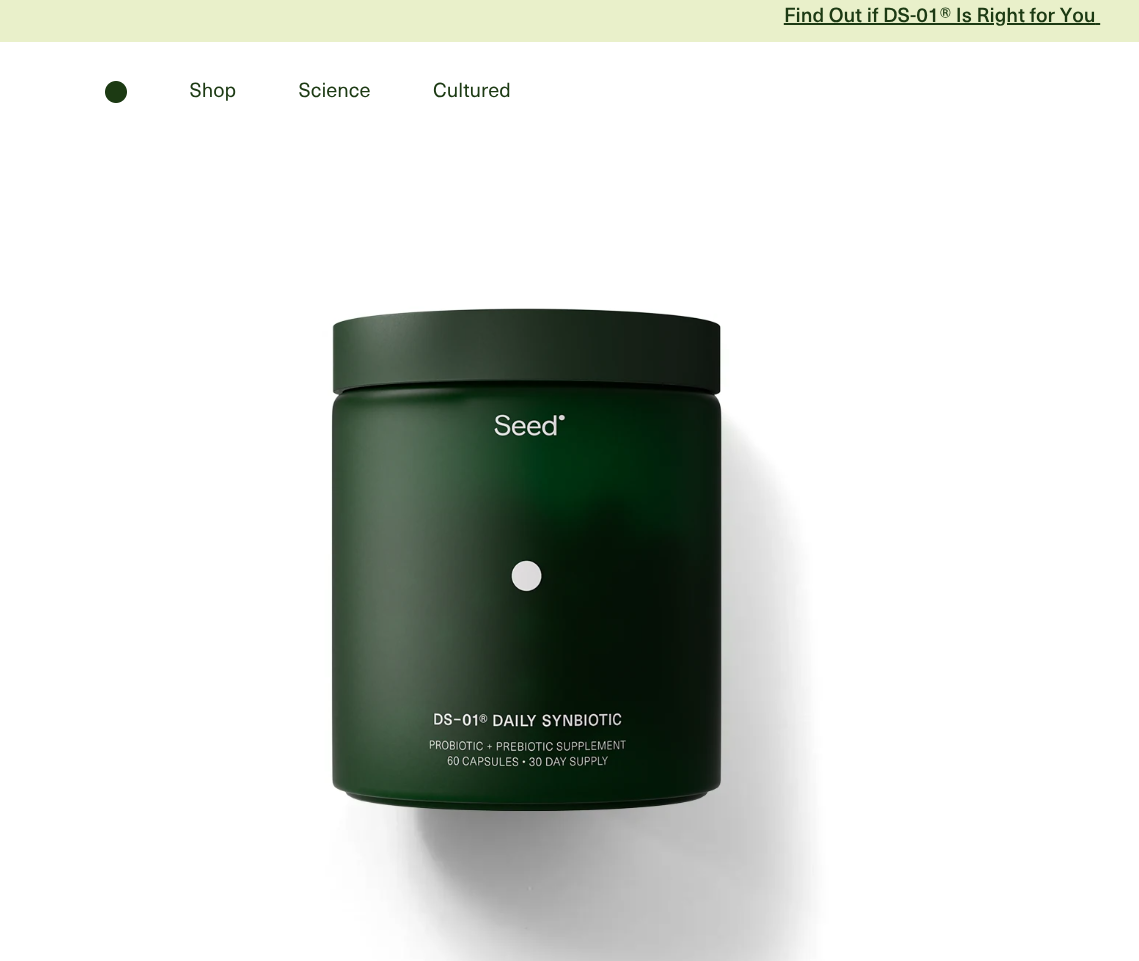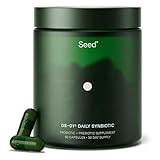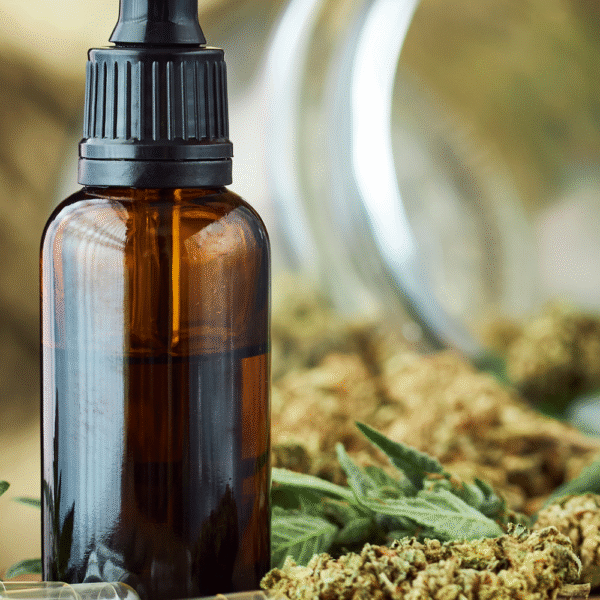Looking for a comprehensive probiotic blend to address multiple systems at the same time? Check out my Seed probiotics review to learn more about this unique combo!
Honest Seed Probiotics Review: A Doctor’s Guide!
As women go through perimenopause and menopause, gut health becomes increasingly important—not just for digestion, but for overall health, hormone regulation, and even mental well-being (brain fog and memory issues are one of the most common complaints when hormones start to shift). The connection between your digestive tract and your sex hormones, primarily estradiol and progesterone, is well-established in scientific research. One tool that can support this delicate balance is a probiotic supplement.
That’s why I’m sharing my Seed probiotic review—specifically the DS-01® Daily Synbiotic, which has gained attention for its unique delivery system, strain diversity, and supportive clinical trials. Let’s break down what makes this dietary supplement stand out, especially what strains can help for women going through the hormonal changes of midlife.
This post may contain affiliate links through which, at no additional cost to you, I may earn a small commission. I only recommend products I have tried and this product is a staple in my current supplement regimen.
What Is Seed DS-01 Daily Synbiotic?
- 2-in-1 Prebiotic + Probiotic: Seed DS-01 Daily Synbiotic is formulated with 24 clinically and scientifically studied probiotic strains and a patented, plant-based prebiotic outer capsule to deliver benefits in and beyond the gut. 53.6 Billion AFU.
- Whole-Body Benefits: In addition to bloating relief and improved regularity, DS-01 is formulated for digestive and whole-body benefits, including gut health, digestive health, gut barrier integrity, immune support, skin health, and hearth health.
- Engineered to Survive: Seed’s patented capsule-in-capsule ViaCap delivery technology protects probiotics through digestion to ensure the full probiotic dose reaches the colon. DS-01 is shelf-stable and no refrigeration is required.
- Getting Started: If it's your first time taking DS-01, or its been more than a week since your last dose, take 1 capsule daily for three days before moving on to 2 capsules daily. You may notice mild gastrointestinal discomfort or changes in digestion. Any discomfort typically resolves in 1-2 weeks.
- Customer Support: DS-01 goes through extensive third party testing for safety and quality. If you have questions about DS-01, or aren't satisfied with your purchase, reach out to us directly and we'd be happy to help.
Seed’s DS-01 is not your average probiotic blend. It combines 24 specific strains of bacteria that have been studied for their impact on gastrointestinal health, the immune system, skin health, and cardiovascular health.
This new probiotic also includes a fiber-based prebiotic in its prebiotic outer capsule, making a unique capsule-within-capsule design. This formulation, according to studies, protects the live bacteria strains from harsh stomach acid and bile salts, helping them reach your GI tract intact. Each serving contains 53.6 billion Active Fluorescent Units (AFU).
CFU (Colony Forming Units) and AFU (Active Fluorescent Units) are both measures of viable bacteria, but they differ in how they are determined and what they reveal about the bacteria. CFU relies on culturing bacteria on agar plates, counting the resulting colonies, and estimating the number of viable, culturable bacteria. AFU uses flow cytometry to identify viable cells using fluorescent dyes, and can also differentiate between live, dead, and active cells.
Seed’s DS-01, like similar products of multi-strain probiotics, is designed to be taken on an empty stomach for best results. It comes in a welcome kit featuring a reusable glass jar and glass travel vial, and can be followed by monthly refills in compostable packaging.
Why Gut Health Is Essential in Perimenopause
During perimenopause, fluctuations in estrogen and progesterone can lead to a range of digestive issues, including bloating, constipation, and food sensitivities. These changes can alter the composition of the gut microbiota, weakening the gut barrier integrity (leading to leaky gut) and increasing inflammation.
A balanced digestive system plays a critical role in detoxifying excess hormones (particularly toxic recirculating estrogen), maintaining immune defenses, and supporting micronutrient synthesis and absorption. This is why adding a probiotic supplement with well-researched strains can be an effective way to support a healthy gut microbiome during this transition.
Seed’s DS-01 targets key functions such as immune function, gut barrier repair, mental health support, and skin issues—all of which can become more problematic in perimenopause and menopause.
The Science Behind Seed
Seed features clinical research and extensive testing, as do many different probiotics on the market. However, there are specific strains included in DS-01 with very strain-specific benefits.
Examples of evidence-backed benefits from Seed’s strains include:
-
Support for symptoms of irritable bowel syndrome
-
Improved skin condition related to inflammation
-
Enhanced production of short-chain fatty acids, which is also helpful for gut health and feeding/supporting the good bacteria.
-
Support for healthy cholesterol levels and heart health
Let’s dive into the details on the unique strains found in SEED ds-01
Skin Health: Strains that Work from the Inside Out
Many women in perimenopause or post menopause notice changes in skin texture, hydration, and clarity. These changes can be tied to both hormonal shifts and gut dysbiosis (imbalance of bad to good bacteria).
Seed addresses this with unique strains like:
-
Bifidobacterium longum SD-BB536-UB: The Bifidobacterium family in general has been shown to be helpful for immune function, weight maintenance, skin health, and gut health. This particular strain of Bifidobacterium longum has been studied for its ability to reduce skin sensitivity and support the skin’s natural barrier function.
-
Lactobacillus plantarum SD-LP1-UB: Known for helping reduce systemic inflammation, which may contribute to clearer skin and fewer hormone-related breakouts.
-
Lactobacillus rhamnosus SD-GG-UB: Backed by research showing potential to improve skin hydration and reduce symptoms of conditions like eczema.
These strains are thought to support the skin through gut-mediated pathways—sometimes referred to as the gut-skin axis. By restoring gut microbiota diversity and reducing endotoxemia, these bacteria may help ease skin issues often intensified by hormone imbalances.
Gut Health: Reinforcing the Core of the Microbiome
DS-01 also includes strains shown to improve gastrointestinal health by promoting gut barrier integrity, assisting or balancing the immune response, and enhancing digestive health. Some of the most beneficial strains in Seed DS-01 for the digestive tract include:
- Bifidobacterium lactis SD-BL4-UB: Known to assist in bowel regularity and reduce bloating and abdominal discomfort.
- Bifidobacterium breve SD-BR3-UB: Supports mucosal integrity and helps regulate inflammatory markers in the GI system.
- Lactobacillus plantarum SD-LP1-UB: Plays a key role in maintaining gut wall integrity, reducing inflammation, and improving digestion. It is also known to inhibit pathogenic bacteria and support immune function within the intestinal environment.
- Lactobacillus fermentum SD-LF1-UB: May aid in micronutrient synthesis, particularly folate and riboflavin—important for energy and hormone processing.
- Lactobacillus casei SD-CE1-UB: Linked to immune function modulation and protection against upper respiratory tract infections.
- Lactobacillus salivarius SD-LS1-UB: May support overall gut barrier integrity and improve oral and gut immune defenses.
- Lactobacillus reuteri SD-LRE2-UB: Aids in gut microbial balance and may have additional benefits for mental health and estrogen metabolism.
- Lactobacillus gasseri SD-LG5-UB: Shown in some studies to support body composition and may help modulate inflammation and weight in midlife women.
Additional Benefits Unique to Seed
Other unique strains that can be beneficial include:
-
Lactobacillus casei SD-CE1-UB: Linked to immune function modulation and protection against upper respiratory tract infections.
-
Lactobacillus fermentum SD-LF1-UB: May aid in micronutrient synthesis, particularly folate and riboflavin—important for energy and hormone processing.
-
Lactobacillus paracasei SD-LP2-UB: Studied for its impact on cardiovascular health and reducing markers associated with inflammation.
Spotlight on Bifidobacterium adolescentis: A Standout Strain
Seed’s DS-01 also includes the powerhouse strain Bifidobacterium adolescentis, which plays several important roles in gut health and systemic support. I test for this strain in my microbiome test, and often find people are deficient in it. Benefits of this strain include:
-
It also promotes the production of short-chain fatty acids (SCFAs), such as acetate and butyrate, which in turn feed beneficial bacteria, reduce inflammation, and improve colon cell function.
-
It’s involved in maintaining gut barrier integrity and has shown benefits in managing symptoms of irritable bowel syndrome.
-
Research suggests B. adolescentis may positively influence estrogen metabolism through its support of the estrobolome, potentially aiding in hormonal balance during perimenopause.
-
It may also help regulate immune activity and insulin sensitivity, both of which are common concerns during the menopausal years.
You can check out SEED ds-01 here or on fullscript!
- 2-in-1 Prebiotic + Probiotic: Seed DS-01 Daily Synbiotic is formulated with 24 clinically and scientifically studied probiotic strains and a patented, plant-based prebiotic outer capsule to deliver benefits in and beyond the gut. 53.6 Billion AFU.
- Whole-Body Benefits: In addition to bloating relief and improved regularity, DS-01 is formulated for digestive and whole-body benefits, including gut health, digestive health, gut barrier integrity, immune support, skin health, and hearth health.
- Engineered to Survive: Seed’s patented capsule-in-capsule ViaCap delivery technology protects probiotics through digestion to ensure the full probiotic dose reaches the colon. DS-01 is shelf-stable and no refrigeration is required.
- Getting Started: If it's your first time taking DS-01, or its been more than a week since your last dose, take 1 capsule daily for three days before moving on to 2 capsules daily. You may notice mild gastrointestinal discomfort or changes in digestion. Any discomfort typically resolves in 1-2 weeks.
- Customer Support: DS-01 goes through extensive third party testing for safety and quality. If you have questions about DS-01, or aren't satisfied with your purchase, reach out to us directly and we'd be happy to help.
Check out the video on my YouTube channel here:
Personal Experience and User Feedback
In my own practice and personal experience, Seed’s DS-01 has stood out for its noticeable improvements within the first month. I personally experienced less bloating, more regular digestion, and even noticed improved skin clarity. I have used it now for four months, and continued to see improvements. Several of my patients have reported similar outcomes, particularly those dealing with stubborn gut issues that weren’t resolved by diet alone.
I have a history of recurrent flares of SIBO, and though I work hard in many other arenas of my life to manage this, SEED has been an important part of my toolkit. I also appreciate, as noted above, that it doesn’t have any inulin or FOS which tend to trigger my SIBO symptoms.
Of course, results can vary, but when combined with a high-fiber diet and lifestyle changes, many women see measurable shifts that improve quality of life and hormonal shift-related skin and gut health symptoms.
DS-01 vs. Other Probiotic Products
There are many different probiotic strains on the market, but not all are created equal. Brands that don’t survive stomach acid, result in minimal benefits. I generally recommend a combination of at least 12 strains, including both lactobacillus and bifidobacterium strains, as well as a formulation that can survive stomach acid. The reason I love Seed is because it has all of the above, and in addtion has antioxidant, sibo friendly prebiotic ingredients, as well as the above mentioned unique strains for skin and immune support.
The formulation is free of binders, preservatives, and major allergens, which is true for many users. But I find Seed DS-01 to be even better for sensitive digestive tracts than many other prebiotic-including strains, because many others include prebiotics that can be bloat-inducing like FOS or inulin.
PDS-08 Pediatric Daily Synbiotic
Seed also offers the PDS-08 Pediatric Daily Synbiotic, designed specifically for kids. This product applies the same unique approach but to children’s gut health, basically meaning its lower dosed, making it a good choice for kids and/or adults who need to start with a lower dose probiotic.
Final Thoughts: Is Seed Worth the Hype?
At $49.99 for a 30-day supply, Seed is on the higher end of the probiotic supplement price spectrum. But considering the potential benefits, extensive testing, and strain-specific formulation, the value can be justified—especially for women navigating hormone-related challenges in the skin and gut health categories.
This probiotic formula may not be a silver bullet, but for many women, it’s a key piece of a more comprehensive approach to hormonal health, digestion, and mental well-being.
Whether you’re dealing with digestive health or skin health challenges, looking to improve immune function, or aiming to support your gut bacteria through menopause, Seed’s DS-01 can play a large role in your daily routine. Just remember—while DS-01 is powerful, it’s not a substitute for medical advice. Talk to your healthcare provider before starting any new supplement, especially during a hormonally dynamic time like perimenopause.
Bottom line: Seed’s DS-01 Daily Synbiotic is a unique, science-backed probiotic supplement for women who want support balancing their gut health, improving digestion, and supporting skin health during a transformative life phase. It’s one of a few key probiotic supplements I confidently recommend in both my clinical and personal worlds.
You may also like:
Probiotics for BV Review: Ultimate Guide to Healing Bacterial Vaginosis.
Happy Mammoth Gut Repair Review: Does it Work?
Estrogen Dominance and Gut Health: How to Heal Both Naturally

Dr. Shelley Meyer is a board-certified family physician and Institute of Functional Medicine-certified functional medicine physician, as well as a Registered Dietitian. She is passionate about helping women navigate the roller coaster of perimenopause and postmenopause. She has her own Functional Medicine Practice in Denver, Colorado.






Leave a Reply
You must be logged in to post a comment.